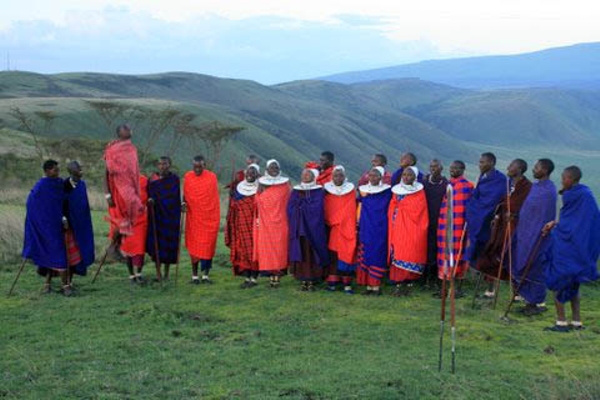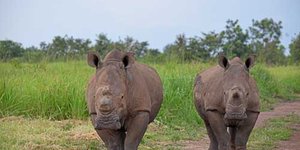Like this article?
Go on, give it a kudu!

Published on June 01 2013
Written by:
LoiseK
876 views
On March 21 2013, the Tanzanian Minister for Natural Resources and Tourism announced the government’s plans to finalize the acquisition of 1,500 square kilometers of land in Ngorongoro District. This announcement reopened a heated debate and community action on a conflict that that has been simmering for over 20 years regarding the Masai community’s right to the ownership of the Loliondo land which forms a part of the Serengeti wildlife corridor.
Tanzania is spectacularly beautiful with a range of delights for tourists, from the high peaks of Kilimanjaro to the marine park on the expansive shores of the Indian Ocean to the delights of the grassy savannah parks. In recognition that tourism is a major contributor to the national GDP, the government has set aside about 25% of the land for wildlife conservation. Quite a bit of this conservation land is in the Serengeti, one of the most spectacular places on Tanzania’s tourist circuit. Its Masai inhabitants, who refer to it as “where the land moves on forever,” named this expansive land “Serengeti”. Indeed, in the Serengeti, the expanse of the savannah grassland is seemingly endless, extending further than the eye can see. And here, there is a wide variety of animals for game lovers ranging from the peaceful zebras, gazelles.........to lions—the preying king of the jungle. Other predators such as cheetahs, leopards, hyenas also call it home, as do large mammals such as elephants, buffaloes, rhinos and crocodiles. It is also home to the spectacular Great Migration that sees over a million wildebeest, accompanied by other mammals, migrate in one large hoof-trumping group from the eastern plain through the Serengeti and across the border to the Masai Mara in Kenya and back in an annual cycle that has been going on since time immemorial.
Since they settled in the Savannah grasslands to north of Tanzania and southern parts of Kenya, the Masai have lived peacefully on this land, grazing their cattle in the lush valleys during the rainy seasons, and moving to grassier valleys in the drier months. Due to their nomadic nature, the Masai need just such a land, vast enough to graze their large herds, even allowing for seasonal migration. Since the beginning of time, they have coexisted peacefully with nature, their animals grazing alongside the herbivores of the wild. A row has been simmering between the government and the local community regarding the ownership of the land for the last 20-odd years. Indeed, this conflict dates back to 1959, when the then British Colonial government moved the Masai from the Serengeti to Loliondo and Ngorongoro areas to pave way for the Serengeti Game Reserve. Today, the government wants to “protect” the land for exclusive hunting and photographic tourism.
There are four dimensions to the conflict. One is the right of the Masai people of Loliondo to what is rightfully their grazing land and a source livelihood for the local community. A second is the land and wildlife conservation. The third is the enhancement of tourism as a key revenue earner. The final dimension is the interest of Ortello Business Company (OBC), an Emirati hunting company, which has caused the most grief with activists and politicians claiming that the government intends to hand over the seized land to OBC for use as a wildlife hunting corridor. The Masai anger over the activities of OBC has been simmering since 1992, when the company leased the land to use it for tourist game hunts, denying the Masai inhabitants access to grazing land and water points that their animals and the wildlife have shared for years. In 2009, police blocked Masai herdsmen from accessing a water point in the land leased to OBC in a conflict that led to the loss of many animals. Since the announcement by the minister in March, human rights activists have intensified efforts to agitate against the planned takeover of land. These efforts have gained even more momentum with Masai elders, who have procured the global support of 1.7+ million people from many different countries. They have co-signed a petition to stop the government from carrying out its planned acquisition. The elders, with support from civil society organizations, have gone all-out in the agitation. Their efforts have included an awareness campaign involving social media on Twitter and Facebook and articles and advertisements in the local and regional press. Further, the community has organized protests including a sit-in by “shuka clad” Masai women claiming rights to their land. Masai politicians from the area have threatened to resign and mobilize the community not to support the ruling “Chama Cha Mapinduzi” party in future elections and have attempted to meet with the president in Dar es Salaam and Arusha without success. Unfortunately, none of these aggressive efforts has all yielded a positive action from this government “of the people,” and the conflict continues.
While the need to protect and conserve wildlife areas is not in doubt, and the importance of the revenues earned from tourism is always at the forefront of one’s mind, there is need for the government to balance these dimensions with the needs of the community that live in affected areas. In the case of Loliondo, it is important for the government of Tanzania to consider the likely negative economic impact of nationalization of the land and of denying the Masai its use for grazing their animals, which are the mainstay of their economic well-being. The impoverishing effect of government land acquisition and sale of community land to international companies is well researched and documented by organizations such as OXFAM GB. In its 2012 Policy Briefing “Promises, Power, and Poverty: Corporate land deals and rural women in Africa,” Oxfam argues that rural communities and women in particular endure the most of the economic impact of such deals.
Has been on: 5 safaris
© Your African Safari Ltd, All rights reserved.
Said on 01 June 2013 18:46
It is a tough balancing act to consider the needs of all involved. However, I'm not sure the needs of a private business should be given any weight. The tourist will come whether or not hunting is involved.
Said on 09 February 2014 08:19
Pushing people away from their ancestral homes in the name of privatization just because they are defenseless..... massive greed!
Your African Safari is a safari-planning and safari review site. It was created to help support a healthy African wildlife population. All reviews are vetted before being approved and only ethical tours are published

Garamba National Park—an anchor of hope in the Democratic Republic of Congo
Published on January 09 2025
By: R.W.

Namibia imposes new visa requirements
Published on July 25 2024
By: yourafricansafari.com

Do I really need travel insurance or travel protection for my safari?
Published on July 30 2024
By: yourafricansafari.com